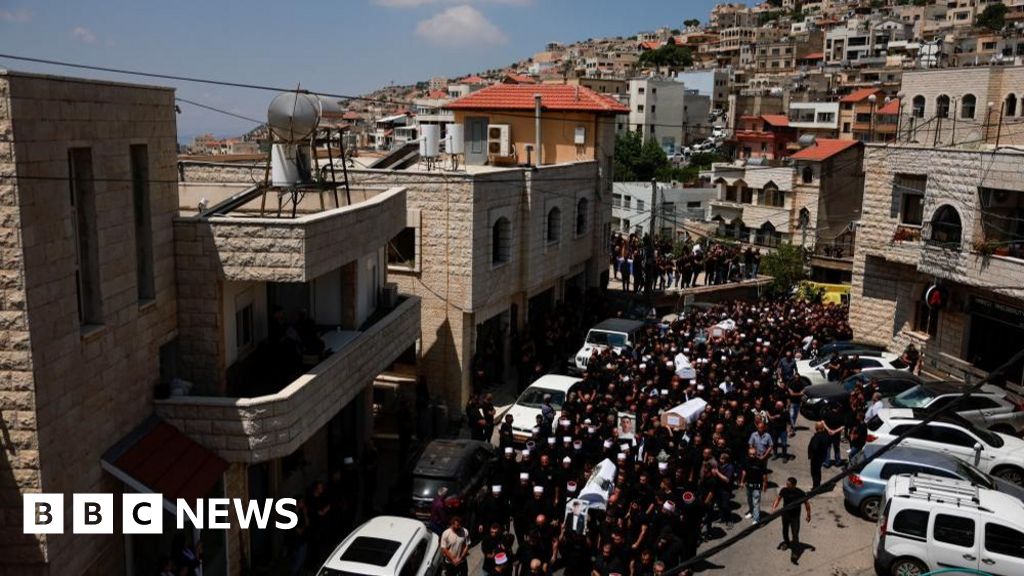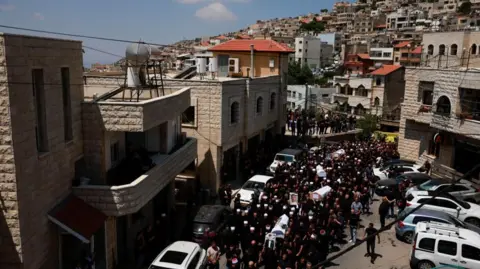 Reuters
ReutersA deadly strike on a playing field in the Israeli-occupied Golan Heights has sharply escalated fears of a new war in the region.
Israel says the Lebanon-based Hezbollah militant group was behind the attack, though the group has denied this.
What happened in the Golan Heights attack?
On the evening of Saturday 27 July, a blast hit a playing field in the town of Majdal Shams, killing 12 children and young people from the minority Druze community.
It was the deadliest incident in or around Israel’s border with Lebanon since hostilities between Israel and Hezbollah escalated in October.
The strike, with its young victims, caused outrage and shock in Israel and around the world.
Israel says Hezbollah carried out the attack with an Iranian-made rocket, fired from a short distance away in Lebanon. The US also says Hezbollah was to blame.
Hezbollah has strongly denied involvement.
What is Hezbollah?
Hezbollah is a heavily armed militant and political movement based in Lebanon – Israel’s northern neighbour.
Its military wing is one of the most powerful forces in the region, equipped with up to 200,000 missiles and rockets, as well as attack drones. It is separate to the Lebanese army, and is much stronger.
Hezbollah is also politically influential in the Lebanese government.
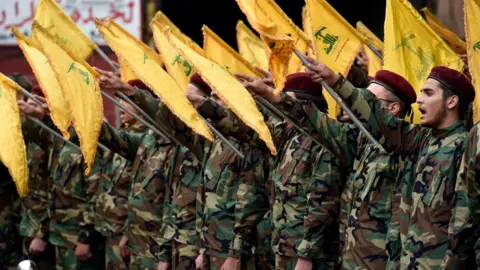 EPA
EPAThe movement follows the Shia branch of Islam and is financed, equipped and trained by Iran, the dominant Shia power in the Middle East.
Hezbollah and its supporters consider it a legitimate resistance movement against Israel, which it claims still occupies part of Lebanese territory. Hezbollah is a strong supporter of Hamas and the Palestinians and rejects Israel’s right to exist.
The movement is banned as a terrorist organisation by Western states, Israel, Gulf Arab countries and the Arab League
What is the Golan Heights and why is Israel there?
The Golan Heights is a rocky plateau in south-west Syria, extending towards north-east Israel.
In the 1967 Middle East war, Israel captured about 1,200 km sq (about 460 square miles) of the Golan Heights, from which Syria had attacked it.
Israel annexed the area in 1981, in a move which has not been recognised by the vast majority of the international community. The Trump administration broke with decades of US policy by recognising Israeli sovereignty over the occupied Golan Heights in 2019.
Syria says the land has always belonged to it and has vowed to recover the territory, while Israel says the heights are crucial for its defence and will remain in its hands forever.
About 20,000 Jewish settlers live on the Golan Heights, which is also home to Israeli military bases and listening posts. The settlements are considered illegal under international law, though Israel disputes this.
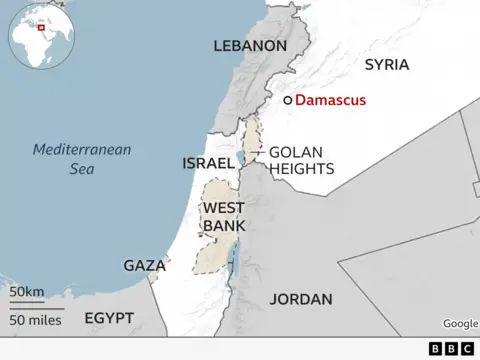
Who are the Druze?
The Druze people are an Arabic-speaking ethnic and religious group who mostly live in Lebanon, Israel, Jordan and Syria. Part of the community has lived on the Golan Heights for centuries.
Those on the Golan Heights went from Syrian to Israeli rule in June 1967, when Israel occupied most of it. Majdal Shams is the largest of four Druze-majority towns there.
Israel offered citizenship to all of the Golan Height’s residents, though many chose to retain their allegiance to Syria.
About 20% of the approximately 21,000 Druze who live there today have accepted or inherited Israeli citizenship. Those who have kept Syrian citizenship also have Israeli residency status, with most of the same rights as Israeli nationals apart from the right to vote.
Beyond the occupied Golan Heights, there about about 110,000 Druze who are full Israeli citizens. They are the largest non-Jewish community which serves in the Israel Defense Forces (IDF), as part of the country’s mandatory national service.
There are about a million Druze in the world, though estimates vary. Their faith is an offshoot of a branch of Shia Islam but theirs is a distinct religion with its own set of practices and beliefs.
Why might Hezbollah have fired at the Golan Heights?
Hezbollah fired at Israeli targets the day after Israel was attacked by Hamas in the south on 7 October. Hezbollah says it is acting in solidarity with the Palestinians.
Since then, the two sides have exchanged fire on a regular basis, forcing thousands of people in Lebanon and Israel from their homes.
Israeli security officials say the rocket which killed the youngsters was part of a barrage which struck several locations on the occupied Golan Heights. That followed an Israeli strike that killed four Hezbollah fighters in south Lebanon.
Most Hezbollah attacks since 8 October have hit northern Israel, with fewer strikes on the Golan Heights. It has, though, repeatedly targeted Israeli military positions on part of the Golan Heights called the Shebaa Farms/Mount Dov, just a few miles from Majdal Shams.
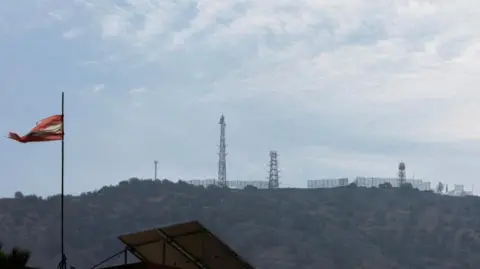 Reuters
ReutersHezbollah may have calculated that the international reaction to attacking an area considered to be under Israeli occupation would be relatively muted, while keeping up pressure on the Israeli government and military as they fight a war in Gaza.
What has it all got to do with Hamas and the war in Gaza?
Hezbollah supports Hamas, which has been at war with Israel since 7 October, when Hamas gunmen launched an unprecedented attack on Israel, killing about 1,200 people and taking 251 others back to Gaza as hostages.
Hezbollah opened up a limited second front in Israel’s north the next day and the two sides have been exchanging fire ever since.
Both Hamas and Hezbollah are backed by Iran (although Hamas is a Sunni Muslim group and Hezbollah is Shia). Both are part of what Iran calls an “axis of resistance”, a loose alliance of like-minded, Iran-backed groups across the Middle East, acting against Israel and Israel’s key ally, the US, in the region.
Hezbollah has not got directly involved in the war in Gaza and has said it will stop firing at Israel if and when there is a ceasefire between Israel and Hamas.

